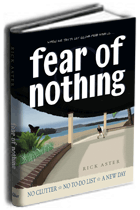I got a question: “How can you take on clutter alone?” The question surprised me, but it shouldn’t have. When you find yourself unexpectedly living alone, it is one of the best times you can imagine for taking on clutter. You have time, and the clutter is right there. Besides your own stuff, there is a strong chance that you are left with some of the debris of someone else’s life, things that can bring you down if you let yourself be surrounded by them. You have a great deal to gain by taking the clutter away.
Yet depending on the circumstances, living alone can also be one of the hardest times to muster the energy to do anything.
Ruth Spencer writes in The Guardian about the challenges of living alone when that’s not what you’re used to. She started out with high hopes:
This, I figured, was going to be my time. . . . I was going to keep my apartment clean. I was going to finally hang that macrame plant and re-decorate my living room. I was going to own my time – and fill it. I looked forward to the silence of solitude, the chance to concentrate instead of entertain.
Shortly, though, the story turns to one of dust, neglect, and discouragement. It can take months to learn how to maintain your emotional equilibrium alone, and even then, you find that keeping up a home that is anything larger than a one-bedroom apartment is a bit of a stretch for one person who also has a job.
Clutter, then, can represent a greater obstacle for a person living alone than when the labor involved can be divided. So how do you take on solo clutter-busting when doing things alone is not the life you know?
The first thing I would emphasize, and this goes for anyone whose routine has been disrupted, is that it is important to be gentle on yourself. This is no time to look in the mirror and demand perfection. You have to get into a sustainable rhythm before that kind of refinement is even thinkable. Think small. First take out the trash or wash the dishes. Then look for one simple way to improve your surroundings. When that’s done, look for one more. After a dozen of these over the course of a day or a week, you’ll have momentum and it will be easier to see where to go next.
One of the possible challenges in facing clutter when you live alone is the feeling of wanting to escape in one way or another. Spencer writes,
And the quiet I thought I would love? I can’t stand it. I get home from work and jump on the phone. I log on to Skype. I turn on the TV or the radio or a podcast immediately.
“Isn’t there somewhere I have to go?” you might ask when faced with the prospect of another evening alone. For a year after I bought my current house, I found I was almost never home. All of a sudden I had to go visit clients in other states. In truth, it was a convenient time for me to travel, but while I was out, my visions of getting my new house set up and organized came together far more slowly than I ever could have imagined. The impulse to escape can still work to your advantage, though. When you get on the Internet, find out where you can donate your excess stuff. Before you rush for the door, grab something you need to take somewhere — something to donate, recycle, or return. With this strategy, you can keep things moving while you keep moving.
Believe it or not, there is good news about solo clutter-busting. Once you get used to it — and you will — it is actually the most efficient way to approach clutter. Most of the time, you really don’t want someone looking over your shoulder, second-guessing decisions that are hard enough to make as it is. Clutter is easiest to take five, ten, or fifteen minutes at a time, episodes that are too small to coordinate with anyone else.
Solo clutter-busting might be efficient, but that’s no consolation if you can’t get yourself moving in the first place. Clutter is intimidating because it quickly brings you face to face with one of life’s biggest questions, “What do I really want my life to be?” When you’re alone with your clutter the question just hangs in the air along with the dust. It is an important question, so don’t run away immediately. Allow the question some time. An answer will eventually come. This answer, even a partial answer, tells you something about your purpose and destiny. That, then, makes everything that follows a little easier.



No comments:
Post a Comment